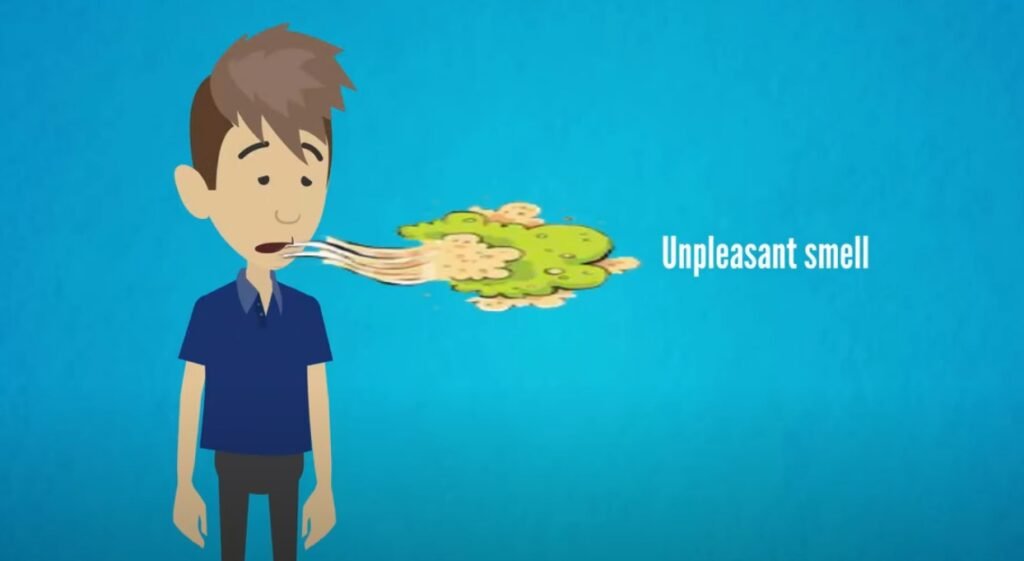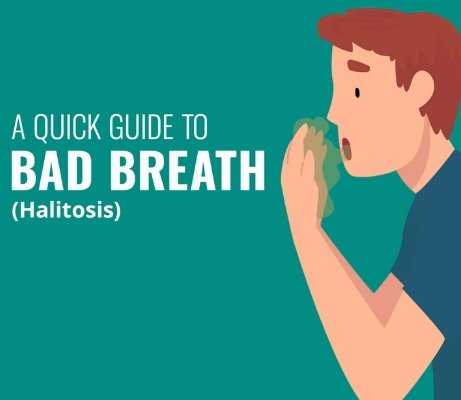Halitosis, commonly known as bad breath, not only affects one’s physical health but also carries a significant social stigma. Many people experience halitosis, yet a considerable number remain unaware of their condition and the discomfort it may cause to others.
Causes of Halitosis:
The primary cause of halitosis often stems from poor dental hygiene and gum conditions. Dental decay, especially at the roots of the teeth, can lead to abscesses in the gums, emitting foul-smelling pus that contributes to unpleasant breath. Additionally, chronic infections or upsets in the nose, throat, respiratory tract, or stomach, such as tonsillitis, lung diseases, gastritis, and sinus issues, can also result in halitosis. Gastrointestinal disorders, particularly chronic constipation, are significant contributors to bad breath, as the body expels waste matter through the lungs. Habits like chewing tobacco, smoking, and certain diseases like anaemia can exacerbate the condition.
Several factors can contribute to bad breath:
- Poor Dental Hygiene: Bacteria breaking down food particles trapped in the teeth or mouth can produce an unpleasant odor. Regular brushing, flossing, and cleaning of dentures are essential.
- Strong Foods and Beverages: Foods like onions and garlic, as well as beverages like coffee, can leave behind odorous compounds that linger in the breath.
- Smoking: Tobacco use not only causes a bad odor but also dries out the mouth, exacerbating halitosis.
- Dry Mouth: Insufficient saliva production can lead to dry mouth, allowing bacteria to thrive and causing bad breath.
- Periodontal Disease: Plaque buildup can harden into tartar, leading to gum disease and pockets where odor-causing bacteria accumulate.
- Sinus, Mouth, or Throat Conditions: Infections or conditions in the respiratory system can result in bad breath, as can tonsil stones.

Diagnosis
To diagnose the cause of bad breath, your dentist will conduct a thorough examination, including smelling your breath and asking questions about your oral hygiene habits, diet, and medical history. If necessary, they may refer you to a physician to rule out underlying health issues.
Symptoms
Bad breath, also known as halitosis or fetor oris, affects nearly everyone at some point. It can manifest as a temporary issue or become a chronic condition. According to the American Dental Association, at least 50 percent of adults have experienced halitosis in their lifetime.
Treatment:
If halitosis is caused by tooth and gum conditions,ronsilis, sinusitis, smoking or anaemia, these conditions must be treated. Once they are eliminated the bad breath will disappear. Similarly, bad breath resulting from gastro intestinal disonders can be successfully treated by correcting these disorders and cleansing the system of morbid matter.
The patients suffering from halitosis should take a well-balanced diet consisting of seeds, nuts, grains, vegetables and fruits, with emphasis on raw and cooked vegetables and fruits.
In case of constipation, all measures should be adopted for is eradication. The patient should avoid refined carbohydrate foods, such as white sugar, white bread and products made from them as well as flesh foods and egg. The patient should also avoid overeating of any kind of foods. He should eat six to eight soaked prunes and a few dried and soaked figs with breakfast. He must also drink the water in which these fruits were soaked. He should also take plenty of liquids and drink six to eight glasses of water daily. This will help eliminate bad breath.
The teeth should be cleaned regularly twice a day especially before going to bed at night. Meat particles should be removed carefully with toothpicks. Munching a raw apple or guava after lunch removes most of the trapped particles. The use of twigs of the margosa (neem) tree as toothbrush is the best method of cleaning the teeth.
Effective treatment of halitosis involves addressing the underlying causes. Dental and gum conditions, sinusitis, smoking, or anaemia should be treated to eliminate bad breath. Similarly, correcting gastrointestinal disorders and maintaining proper hygiene can significantly improve the condition. Patients are advised to adopt a well-balanced diet rich in seeds, nuts, grains, vegetables, and fruits, emphasizing both raw and cooked varieties. Avoidance of refined carbohydrates, overeating, and consumption of plenty of liquids, including water, is essential for combating bad breath. Regular dental care, including brushing teeth twice a day and consulting a dentist for decaying teeth or bleeding gums, is crucial for oral health.

Home Remedies:
Several home remedies have proven effective in treating halitosis. Fenugreek tea, made from fenugreek seeds, is known for its corrective properties. Boiling fenugreek seeds in water and straining the mixture to prepare a tea can help alleviate bad breath. Avocado, rich in essential nutrients, is superior to conventional mouth lotions for combating intestinal putrefaction, a significant cause of bad breath. Unripe guava, with its tannic, malic, and oxalic acids, serves as an excellent tonic for oral health. Chewing tender guava leaves or consuming guava juice can help alleviate bleeding gums and bad breath. Additionally, parsley, when boiled with cloves and used as a mouthwash or gargle, offers relief from halitosis. Fruit and vegetable juices, especially those from apple, grapefruit, lemon, pineapple, tomato, carrot, and celery, are recommended for individuals suffering from bad breath.
Fenugreek, or methi, is one of the several home treatments for halitosis that has shown to be the most successful. a tea prepared from the vegetable’s seeds. bhis tea is pe faken regaty o correcting the condition. This tea is prepared by puting t respont of see in hal over a lo com evate and loney. It should then be strained and used as tea.
Another effective remedy for bad breath is the use of avocado (kulu naspat) which is far superior to any mouth lotion. or remedies for this condition. It effectively removes intestinal putrefaction or decomposition which is one of important causes of bad breath.
The unripe guava (amrud) is useful in halitosis. It is rich in tannic, malic, oxalic and phospheric acids as well as calcium, oxalate and manganese. Chewing it is an excellent tonic for the teeth and gums, It helps cure bleeding from gums due to stric effect and stops bad breath.
Two cups of water should be boiled and several sprigs of parsley, coarsely chopped, should be steeped in this water along with two or three whole cloves or a quarter spoon of ground cloves. This mixture should be stirred occasionally while cooling. It should then be strained and used as a mouth wash or gargle several times a day. For those who suffer from halitosis, all fruit and vegetable juices are helpful in treatment and should be consumed in large quantities. Particularly advantageous are juices made from fruits like apples, grapefruit (chakatora), lemons, pineapples, and vegetables like tomatoes, carrots, and celery.
A person with bad breath should exercise frequently because one of the main reasons of constipation, which in turn promotes halitosis, is inadequate exercise.

Exercise and Prevention:
Regular exercise plays a vital role in preventing halitosis, as lack of physical activity often leads to constipation, a significant contributor to bad breath. Incorporating exercise into one’s routine can help maintain proper gastrointestinal function and overall health, reducing the likelihood of halitosis.
Halitosis, though common, should not be overlooked due to its social and health implications. By addressing underlying causes, adopting healthy lifestyle habits, and incorporating home remedies, individuals can effectively combat bad breath and improve their quality of life.
Conclusion
Halitosis is not just a health issue but also a social concern, impacting individuals’ confidence and well-being. By understanding the causes, treatment options, and prevention methods discussed above, you can take proactive steps to combat bad breath and enjoy fresh, confident smiles every day.

Frequently Asked Questions (FAQs)
Q1. What are the main causes of halitosis?
The main causes of halitosis include poor oral hygiene, dental decay, gum disease, gastrointestinal disorders, dry mouth, and smoking.
Q2. Can halitosis be treated?
Yes, halitosis can be treated by addressing underlying dental and medical conditions, practicing good oral hygiene, maintaining a balanced diet, and staying hydrated.
Q3. Are there any effective home remedies for halitosis?
Yes, several home remedies, such as fenugreek tea, chewing unripe guava, and using parsley mouthwash, can help alleviate halitosis.
Q4. How does hydration affect halitosis?
Staying hydrated helps prevent halitosis by keeping the mouth moist and washing away food particles and bacteria that contribute to bad breath.
Q5. Is exercise important in preventing halitosis?
Yes, regular exercise promotes proper digestion, prevents constipation, and contributes to overall health, which can help prevent halitosis.
